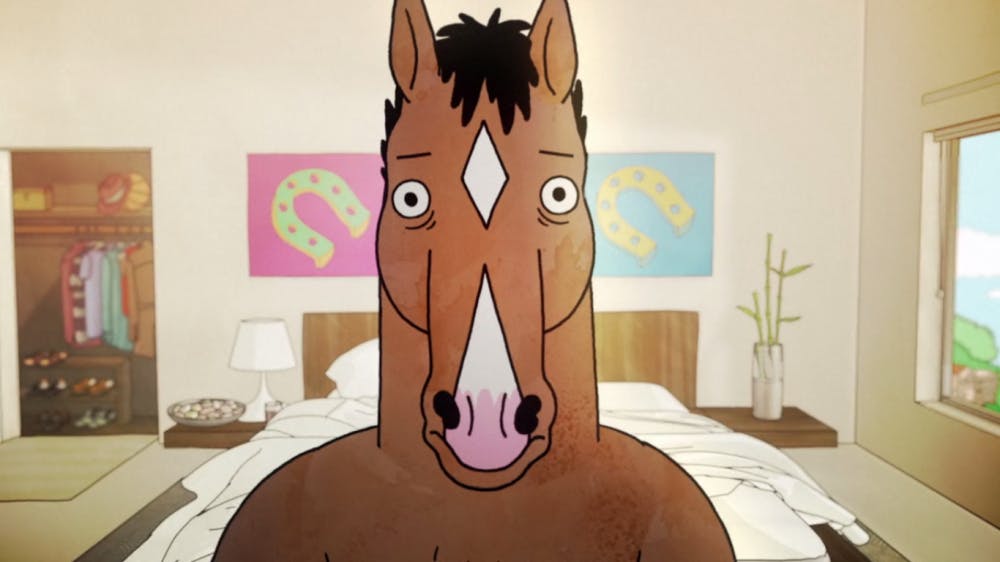BoJack is back and seemingly doing well, for once. He’s starring in gritty TV drama “Philbert,” pursuing what seems like a potentially healthy relationship with his co-star, Gina (Stephanie Beatriz of Brooklyn Nine-Nine) and is giving his best effort to keep it together. But as all fans of the show are well aware by now, BoJack is never far from the precipitous brink of depressing self-hatred he’s teetered on for the past four seasons. Season five begins on a deceptively optimistic note, but as usual, spirals into increasingly dark territory.
The new season just about manages to match the near-impossible gold standard set by season four — the humor is as on-point as it’s been since seasons one and two, and this season is perhaps the most topical one yet. It expands beyond the moving — though admittedly limited — world of BoJack’s own demons and deftly explores the current moment in celebrity culture, making some very valuable points about the #MeToo movement.
The plotlines surrounding BoJack himself are always the most moving and often disturbing, and this season is no exception. The question this season poses, though, is a new one — is BoJack redeemable? Does he deserve the audience’s sympathy? Does he deserve more second chances after destroying his most meaningful relationships time and again?
His deep-seated issues play out in many of the same ways throughout the current season as they have previously — his addiction, depression and anxiety remain unshakable weights constantly pressing down on him. When his half-sister Hollyhock (Aparna Nancherla) tries to reconnect with him yet again, he ends up spending the entire day with her in increasingly sketchy locales in search of opioid painkillers to stave off his withdrawal. He develops a relationship with Gina, but struggles, as always, to form any meaningful connection through romance.
As the season progresses, his opioid addiction begins to dominate him and crowd out what little good he has in his life. He begins to lose his grip on reality, spiraling into delusional paranoia, yet characteristically refuses to admit his problem — “It’s not ‘high,’ Gina,” he explains to his co-star in an angry confrontation. “It makes things normal.” Eventually he can’t tell the difference between reality and his show, and in a daze of drug-fueled anger, he makes even more unforgivable mistakes.
“BoJack” hardly pretends that its titular protagonist is likeable, but the show has always nudged the viewer toward empathy for BoJack. In the heartbreakingly brilliant episode “Stupid Piece of Sh-t” from the previous season, the audience sees the self-loathing he heaps upon himself as penance for his countless mistakes and feels a twinge of sympathy. But this season suggests that maybe that’s not enough — that maybe there’s nothing he could do that would be enough to make up for his actions. That’s not to say he doesn’t try — in one of the final episodes, he asks reporter friend Diane (Alison Brie) to write a scathing exposé sharing the ugly truth of his latest scandal so that he can be held accountable. But her response is telling and topical. She tells him he can never be held accountable, that the public eye will shift its burning gaze soon enough, sooner than his despicable actions warrant.
This, too, is an ongoing theme throughout the season — “BoJack,” always cuttingly topical, explores what sort of real consequences the #MeToo movement might have. Episode four features a fictional awards show called the “Forgivies,” in which “Hollywoo” welcomes back actors and forgives them for their unforgivable offenses. There’s nothing Hollywood executives — and powerful men generally — love more, the show suggests, than acting as though a few months’ vacation out of the public eye is penance for any sort of offensive misconduct.
It’s a heavy and very relevant question, and “BoJack,” as always, approaches it with hard-hitting emotional scenes back-to-back with unparalleled silly and irreverent humor. These two sides of “BoJack” are masterfully intertwined into the same plotline.
For example, the asexual, lovable character of Todd (Aaron Paul) develops a crude “sex robot” in hopes of satisfying a girl he wants to date only romantically. The robot, by a series of characteristically wacky hijinks, is promoted to CEO of the company producing “Philbert.” In a format reminiscent of the simply genius character Vincent Adultman — three kids in a trenchcoat who have a very mature relationship with Princess Carolyn (Amy Sedaris) in an earlier season — no one notices that the sex robot is, in fact, a sex robot, and everyone is instead wowed by his business acumen due to insightful comments like “give it to me” and “that’s my favorite position” and the classic “nice boobs.” It’s undoubtedly one of the funniest plotlines of the season — maybe of the entire show — but, believe it or not, the subplot manages to make room for social commentary, too.
The supporting cast continues to be a source of excellent comic relief to balance out the heavier themes of the season, but some characters see plenty of interesting new development, too. Mr. Peanutbutter (Paul F. Tompkins), who to this point has consistently been a source of nothing but unbounded optimism and silly naiveté, is forced to confront his own unhealthy expectations for his romantic partners. Princess Carolyn struggles to balance her desire to adopt a child with her overwhelming stress about living up to the standard of a “good mother.” Diane goes on a journey of self-discovery to Vietnam in one of the most well-crafted episodes of the season, “The Dog Days Are Over” — but of course, since this is “BoJack,” doesn’t find the happy ending she’s looking for.
The season ends on what, by “BoJack’s” standards, could be considered an uplifting note. It seems as though BoJack is finally ready to face his problems — at least some of them — head-on, and accept love and friendship from those who care about him. But it’s a bittersweet finish, and not just because longtime “BoJack” fans know it’ll only be a matter of time before BoJack falls back into his old bad habits. It’s bittersweet because this season, from start to finish, suggests that getting better is a privilege BoJack may have lost years ago. Even if he could have a better life next season, are viewers right to want that for him? It’s a question that will linger with all those who watch season five, and it’s one that reaches beyond the silly, messed-up, fictional universe BoJack inhabits into the real world. But as always, “BoJack” never lets the heavy stuff weigh too heavily — with its characteristically clever humor, the show manages to pull itself out of each depressive period better than its protagonist ever can.





